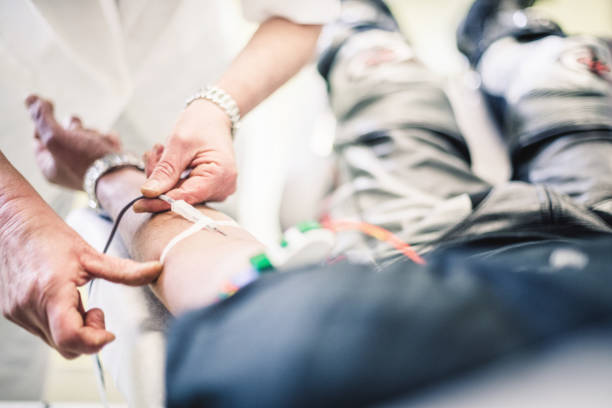Why Donate Blood?
Donating blood is one of the most impactful ways to make a difference in someone's life. Every day, thousands of people rely on blood donations to survive surgeries, recover from illnesses, and manage chronic conditions. The need for blood is constant, and it is essential for hospitals to have a steady supply to meet the demands of patients. Blood cannot be manufactured; it can only come from generous donors who are willing to give a part of themselves to save others.
The Importance of Blood Donation
Blood donation is crucial for several reasons. First, it helps save lives. Accident victims, surgical patients, and individuals undergoing cancer treatment often require blood transfusions. Blood donations ensure that hospitals have the necessary supplies to provide these life-saving treatments. Additionally, donated blood is used in medical research, helping scientists develop new treatments and understand diseases better.
Furthermore, blood donation supports a sense of community and social responsibility. By donating blood, individuals contribute to the health and well-being of their community. It is a selfless act that can inspire others to do the same, creating a ripple effect of generosity and compassion.
The Blood Donation Process
The process of donating blood is straightforward and typically takes about an hour from start to finish. It begins with registration, where the donor provides personal information and answers questions about their health and travel history. This ensures the safety of both the donor and the recipient.
Next, a brief medical examination is conducted. This includes checking the donor's blood pressure, pulse, temperature, and hemoglobin levels. These checks ensure that the donor is healthy enough to give blood. Once cleared, the donor proceeds to the donation area, where a sterile needle is used to draw blood from the arm. The actual donation takes about 10 minutes, during which the donor can relax and stay hydrated.
After donating, the donor is advised to rest for a few minutes and have a snack to replenish their energy. They are also given guidelines on post-donation care, such as avoiding strenuous activities for the rest of the day and staying hydrated. The entire process is safe, and the equipment used is sterile and disposable, ensuring no risk of infection.
Types of Blood Donations
There are several types of blood donations, each serving a different purpose. Whole blood donation is the most common and involves donating a pint of blood, which is then separated into its components—red cells, plasma, and platelets. These components can be used for various medical treatments, making whole blood donation highly versatile.
Platelet donation, or apheresis, involves collecting only platelets, the component of blood that helps with clotting. Platelets are crucial for patients undergoing chemotherapy, organ transplants, or those with bleeding disorders. Plasma donation, on the other hand, involves collecting the liquid portion of the blood, which contains proteins and antibodies. Plasma is often used to treat patients with liver conditions, burns, or severe infections.
Double red cell donation is another option, where the donor gives two units of red cells during one donation session. This type of donation is beneficial for patients with severe anemia or those undergoing major surgeries. Each type of donation has its own specific requirements and intervals between donations, ensuring donors have enough time to recover.
Eligibility Criteria for Donating Blood
To ensure the safety of both donors and recipients, there are specific eligibility criteria for donating blood. Generally, donors must be in good health, weigh at least 110 pounds, and be at least 17 years old (16 with parental consent in some areas). There are also guidelines regarding travel history, recent vaccinations, and certain medical conditions that may temporarily or permanently disqualify someone from donating.
Donors are encouraged to check with their local blood donation center for specific requirements, as these can vary based on location and the type of donation. It is also important for potential donors to disclose any medications they are taking, as some medications may affect their eligibility to donate.
The Impact of Blood Donations
The impact of blood donations cannot be overstated. Each pint of donated blood can save up to three lives. This means that a single donor has the potential to make a significant difference in the lives of multiple patients. Blood donations are essential for surgeries, trauma care, cancer treatments, and managing chronic illnesses such as sickle cell disease.
In addition to saving lives, blood donations help maintain a stable blood supply, which is crucial during emergencies and natural disasters. During such events, the demand for blood often increases, and having a ready supply can make a critical difference in the response efforts. Regular blood donations ensure that blood banks are well-stocked and prepared for any situation.
The Role of the Red Cross
The Red Cross plays a vital role in blood donation efforts worldwide. As one of the largest humanitarian organizations, the Red Cross operates blood donation centers and organizes blood drives to collect donations. They also manage the storage, testing, and distribution of blood products, ensuring that hospitals and clinics have access to safe and reliable blood supplies.
The Red Cross also provides education and awareness campaigns to encourage blood donation. These campaigns highlight the importance of donating blood and address common misconceptions that may deter potential donors. By partnering with schools, businesses, and community organizations, the Red Cross aims to create a culture of giving and ensure a steady flow of blood donations.
Overcoming Common Misconceptions
Despite the critical need for blood donations, there are several misconceptions that prevent people from donating. One common myth is that donating blood is painful. In reality, the process involves only a slight pinch when the needle is inserted, and most donors find the experience to be relatively painless.
Another misconception is that blood donation is time-consuming. While the entire process takes about an hour, the actual donation itself only takes about 10 minutes. The remaining time is spent on registration, a brief medical check-up, and post-donation care.
Some people believe that their blood type is not needed or that there is already enough blood in the system. However, all blood types are needed, and there is a constant demand for donations to keep up with medical needs. Additionally, the shelf life of blood products is limited—red cells last for about 42 days, platelets for five days, and plasma can be frozen for up to a year. This means that a continuous supply of fresh donations is essential.
How to Get Involved
Getting involved in blood donation is easy and rewarding. Individuals can find local blood donation centers or blood drives through the Red Cross website or mobile app. Many workplaces, schools, and community centers also host blood drives, making it convenient for people to donate.
Volunteering at blood donation events is another way to contribute. Volunteers help with registration, providing refreshments to donors, and ensuring that the donation process runs smoothly. By volunteering, individuals can support the efforts to collect blood and encourage others to donate.
For those unable to donate blood, there are other ways to support blood donation efforts. This includes spreading awareness through social media, organizing blood drives, or making financial contributions to organizations like the Red Cross. Every effort counts and helps ensure that those in need receive the life-saving blood they require.
Personal Stories of Blood Donation
Personal stories from blood recipients and donors highlight the profound impact of blood donation. Hearing firsthand accounts of how donated blood saved a life or helped someone recover can be incredibly motivating. These stories often inspire others to donate and reinforce the importance of maintaining a robust blood supply.
Recipients often share their gratitude for the anonymous donors who gave them a second chance at life. Donors, on the other hand, talk about the sense of fulfillment and purpose they feel knowing that their blood has made a difference. These narratives are powerful reminders of the human connection and the life-saving power of blood donation.
The Future of Blood Donation
Advancements in medical technology and research continue to improve the blood donation process and the safety of blood products. Innovations such as pathogen reduction technologies and better storage solutions are enhancing the quality and longevity of donated blood.
Moreover, efforts to develop synthetic blood and expand the use of blood substitutes hold promise for the future. While these technologies are still in the research phase, they could potentially reduce the reliance on donated blood and provide alternative solutions for patients in need.
In the meantime, the need for human blood donations remains critical. As populations grow and medical advancements increase the number of patients who can be treated, the demand for blood will continue to rise. It is essential for individuals to recognize the ongoing need and consider becoming regular donors.
Conclusion
Blood donation is a vital act of compassion and generosity that saves lives and supports the health of communities. The process is simple, safe, and immensely rewarding. By donating blood, individuals can make a significant impact on the lives of patients in need and contribute to the overall well-being of society. The Red Cross and other organizations play a crucial role in facilitating blood donations and ensuring a steady supply of blood products. Through education, awareness, and continuous efforts to encourage donations, we can work together to meet the constant demand for blood and save countless lives.




